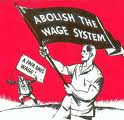
does one define "working class"? I always have
the feeling when I come across references to
"the workers," etc. that probably the writer
has an image in his/her head, that harks back
a half century or so and has no particular grip on
current actuality.
***************************
Wobbly:
The working class is made up of those men and women who make their living from wages. Most of the people in industrialsed countries are in the working class and not in the employing class or the landlord class. There are also people who sell their skills directly to a customer, kind of one on one, as opposed to an employer.
******************************
Old leftist professor:
Most workers today are _not_ blue collar.
current actuality.
***************************
Wobbly:
The working class is made up of those men and women who make their living from wages. Most of the people in industrialsed countries are in the working class and not in the employing class or the landlord class. There are also people who sell their skills directly to a customer, kind of one on one, as opposed to an employer.
******************************
Old leftist professor:
Most workers today are _not_ blue collar.
So what are the "signs" of
class that one can organize around?
*********************************
Wobbly:
The basic dependency structure inherent in Capital is a good guide. Workers are dependent on employers buying their skills in the labour market. If workers don't make a sale of their skills to an employer, they will have a hard time making ends meet. They often become homeless after extended periods of unemployment. Sometimes they become eligible for government handouts of parts of the wealth they've already created and given over to the employing class in exchange for wages e.g. food stamps or in Australia, Centrelink payments.
***************
Old leftist professor:
At a highly abstract level of _capitalism_ as such
class that one can organize around?
*********************************
Wobbly:
The basic dependency structure inherent in Capital is a good guide. Workers are dependent on employers buying their skills in the labour market. If workers don't make a sale of their skills to an employer, they will have a hard time making ends meet. They often become homeless after extended periods of unemployment. Sometimes they become eligible for government handouts of parts of the wealth they've already created and given over to the employing class in exchange for wages e.g. food stamps or in Australia, Centrelink payments.
***************
Old leftist professor:
At a highly abstract level of _capitalism_ as such
it is easy to define _working class_ and essential
to do so. But at a practical level of
organizing struggle it is probably not relevant.
organizing struggle it is probably not relevant.
*************
Wobbly:
I disagree. As Marx and Engels wrote back in 1848: "The proletarian movement is the self-conscious, independent movement of the immense majority, in the interest of the immense majority." I think that's a practical principle to operate with.
Wobbly:
I disagree. As Marx and Engels wrote back in 1848: "The proletarian movement is the self-conscious, independent movement of the immense majority, in the interest of the immense majority." I think that's a practical principle to operate with.
Listen up now. These figures concern the distribution of wealth (and therefore power) in the USA. Similar figures exist in every State where the wage system prevails.
Of investment assets 90 percent of Americans (the working class) own 12.2 percent. The rest goes to the top 10 percent. The top 10 percent are those people in the employing class, the landlord class and independent service providers e.g. lawyers and doctors who sell their skills directly to a customer without having that sale mediated by employment for a wage or salary at a corporation. The median household income in the U.S. is $50,000. Only 34% of U.S. households make more than $65,000 per year. The bottom 90 percent (the working class) have been saddled with 73 percent of all debt. In other words much of what constitutes workers' so-called wealth is connected to debt. Debt is slavery for many especially with egregious credit card companies taking people out with absurd levels of interest. Yet the corporate propaganda machine is strong and mighty. Have you ever received an inheritance? A large one? Probably not because only 1.6% of all Americans receive an inheritance larger than $100,000.







